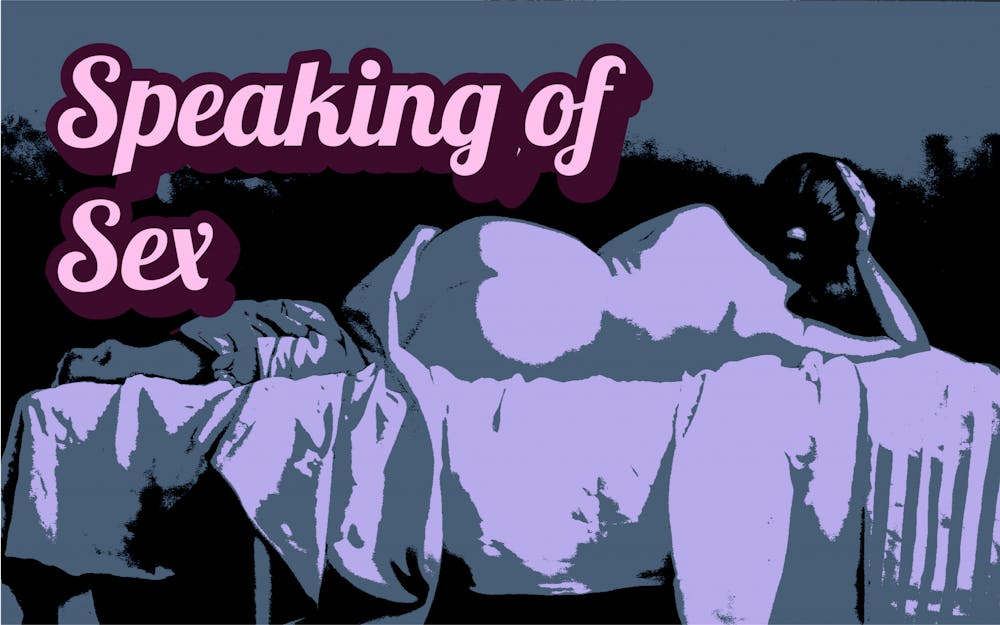During the COVID-19 lockdown, I habitually, mindlessly scrolled through TikTok. The app’s algorithm tailored its content to my deepest inhibitions. I found myself on queer and nonbinary TikTok, where people shared their lived experiences and relationship with gender identity and sexuality in a geographically unconstrained space.
After a while, I began to question the reason why I had always identified as a cisgender woman. TikTok figured out I was queer in both my gender and sexuality before I did.
If you’ve ever experienced shame due to a desire you’ve had, the identity you hold or body you inhabit, you’ve felt the weight of a society that relies on internalized shame. American culture dictates how we should or shouldn’t have sex and polices our performance of sex and gender. It operates at both the individual and systemic level.
Speaking of Sex will be an affirming, nonjudgmental space exploring a myriad of topics related to gender and sexuality such as bodily normalization, pleasure-focused sex, healthy boundaries, consent and alternative relationships. Together, we will open a dialogue about how to overcome the internalized shame so many of us hold onto.
Every Sunday, I will answer reader-submitted questions with the help of professors at the Kinsey Institute and the School of Public Health, sex educators, students and sex-positive community members.
In this series, I hope to help readers answer questions they have about their identity and confront the shame we collectively experience.
I invite you to join me and submit questions anonymously or through email at speakingofsex2@gmail.com.
Collectively, we’ve felt the overwhelming stress, trauma and grief associated with the COVID-19 pandemic. The ongoing health crisis, economic crisis and stronghold of white supremacy has caused emotional and physical turmoil. In facing so much loss, the past year has invited many of us to decide how we want to live our lives, portray our values and contribute to our communities.
Coming to terms with my gender identity during lockdown proved how social interaction is intrinsically linked to gender performance. Following years of living in confusion and shame, I finally had the space to question what my gender meant for me and how I can embrace myself unapologetically.
In her 2018 book “Your Body is Not an Apology: The Power of Radical Self-Love,” author Sonya Renee Taylor argues the United States’ political, economic and social systems thrive on our fragmented sense of self and inform how we feel about our bodies and others.
“Racism, sexism, ableism, homo- and transphobia, ageism, fatphobia are algorithms created by humans’ struggle to make peace with the body,” Taylor said in the book. “A radical self-love world is a world free from the systems of oppression that make it difficult and sometimes deadly to live in our bodies.”
Growing up in a heteronormative culture, my femininity and straightness had been compulsory. Being in isolation forced me to confront my shame and reassess my relationships with the people around me.
“We did not start this life in a negative partnership with our bodies,” Taylor said.
TikTok connected me to queer content creators and other users who helped me understand my place in the queer community. I began to reflect on all of the ways I’ve suppressed my queerness or felt ashamed of my body because it fell outside the rigid binaries I had been assigned since birth.
Radical self-love is not a destination we are trying to reach, but rather an inner peace already instilled within us. Shame is a nasty indoctrination we are no longer obligated to keep. Together with its audience, Speaking of Sex will fight this shame in the pursuit of self-love.
Submit questions to Speaking of Sex anonymously or email speakingofsex2@gmail.com.
Peyton Jeffers (she/they) is a senior studying human development, family studies and human sexuality. She is a member of Camp Kesem at Indiana University.






